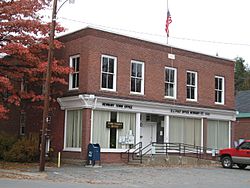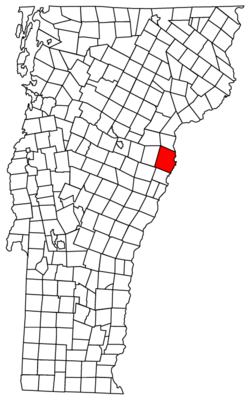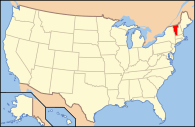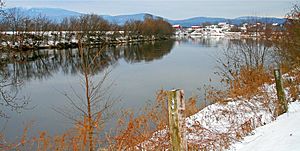Newbury (town), Vermont facts for kids
Quick facts for kids
Newbury, Vermont
|
|
|---|---|
|
Town
|
|

Town office and post office
|
|

Located in Orange County, Vermont
|
|

Location of Vermont with the U.S.A.
|
|
| Country | United States |
| State | Vermont |
| County | Orange |
| Chartered | 1763 |
| Communities | Newbury Wells River |
| Area | |
| • Total | 64.4 sq mi (166.9 km2) |
| • Land | 64.2 sq mi (166.2 km2) |
| • Water | 0.3 sq mi (0.7 km2) |
| Elevation | 774 ft (236 m) |
| Population
(2020)
|
|
| • Total | 2,293 |
| • Density | 35.61/sq mi (13.739/km2) |
| Time zone | UTC-5 (EST) |
| • Summer (DST) | UTC-4 (EDT) |
| ZIP Codes | |
| Area code(s) | 802 |
| FIPS code | 50-48175 |
| GNIS feature ID | 1462158 |
| Website | www.newburyvt.org |
Newbury is a town in Orange County, Vermont, United States. In 2020, about 2,293 people lived there. Newbury is made up of several smaller communities, including the villages of Newbury, Center Newbury, West Newbury, South Newbury, Boltonville, Peach Four Corners, and Wells River.
Contents
History of Newbury
Newbury is located at a large bend in the Connecticut River called the "Great Oxbow." This area has very rich and beautiful land. It was a favorite spot for Native American people, especially the Pennacook tribe. Their village was called Cowass or Cowassuck. In the Abenaki language, "Coo-ash-auke" means "place of pine trees." This name was used for the upper Connecticut River Valley.
European settlers first arrived in 1762. The town of Newbury was officially created on March 18, 1763, by Governor Benning Wentworth. Many of the first settlers came from a town called Newbury in Massachusetts.
Early Roads and Farming
General Jacob Bayley started building the Bayley Hazen Military Road in 1760. This road helped connect Newbury to other areas. In the early days, farmers had to take their grain by canoe about 60 miles (97 kilometers) to Charlestown, New Hampshire, to have it ground into flour.
By 1859, Newbury had two gristmills (for grinding grain), a paper mill, and a steam mill. The main work in the rich river meadows was raising beef cattle and sheep. People also produced wool and dairy items. The Connecticut & Passumpsic Rivers Railroad opened in 1848, connecting Newbury to the village of Wells River.
Fires and Education
In the summer of 1913, a big fire destroyed 21 buildings in Newbury. This included a church, the public school, a hotel, and many businesses and homes. The town was saved from more damage only because the wind changed direction. At that time, Newbury did not have a fire department.
Boston University, a large university in New England, actually started in Newbury, Vermont! It began as the Newbury Biblical Institute, a Methodist school founded in 1839.
Geography of Newbury
Newbury is located at .
The town covers about 64.4 square miles (166.9 km2). Most of this area is land (64.2 square miles or 166.2 km2), and a small part is water (0.3 square miles or 0.7 km2). The Connecticut River forms the eastern border of Newbury. The town also has smaller rivers and brooks, like the Wells River, Halls Brook, and Peach Brook.
Major roads that cross through Newbury include ![]() Interstate 91,
Interstate 91, ![]() U.S. Route 5, and
U.S. Route 5, and ![]() U.S. Route 302.
U.S. Route 302.
Nearby Towns
 |
Groton | Ryegate | Bath (NH) |  |
| Topsham | Haverhill (NH) | |||
| Corinth | Bradford | Piermont (NH) |
Population Information
| Historical population | |||
|---|---|---|---|
| Census | Pop. | %± | |
| 1790 | 872 | — | |
| 1800 | 1,304 | 49.5% | |
| 1810 | 1,363 | 4.5% | |
| 1820 | 1,623 | 19.1% | |
| 1830 | 2,252 | 38.8% | |
| 1840 | 2,579 | 14.5% | |
| 1850 | 2,984 | 15.7% | |
| 1860 | 2,549 | −14.6% | |
| 1870 | 2,241 | −12.1% | |
| 1880 | 2,316 | 3.3% | |
| 1890 | 2,080 | −10.2% | |
| 1900 | 2,125 | 2.2% | |
| 1910 | 2,035 | −4.2% | |
| 1920 | 1,908 | −6.2% | |
| 1930 | 1,744 | −8.6% | |
| 1940 | 1,723 | −1.2% | |
| 1950 | 1,667 | −3.3% | |
| 1960 | 1,452 | −12.9% | |
| 1970 | 1,440 | −0.8% | |
| 1980 | 1,699 | 18.0% | |
| 1990 | 1,985 | 16.8% | |
| 2000 | 1,955 | −1.5% | |
| 2010 | 2,216 | 13.4% | |
| 2020 | 2,293 | 3.5% | |
| U.S. Decennial Census | |||
In 2000, Newbury had 1,955 people living in 816 households. About 29.4% of these households had children under 18. The average household had 2.40 people.
The population was spread out by age:
- 24.2% were under 18 years old.
- 17.2% were 65 years or older.
The average age in Newbury was 42 years.
Places to Visit
Newbury has several interesting places:
- Bayley Historic District
- Bedell Covered Bridge site
- Camp Farwell, founded in 1889, is thought to be the longest-running girls' summer camp in the United States.
- Newbury Historical Society & Museum
- Newbury Town House (built in 1839)
- Oxbow Historic District
- Newbury Village Store, built around c. 1840
Famous People from Newbury
Many notable people have connections to Newbury:
- Horace W. Bailey, a US Marshal for Vermont.
- Jacob Bayley, a general during the American Revolution.
- Frank M. Bryan, a political scientist.
- Molly Gray, a politician.
- Ernest N. Harmon, a major general.
- Diana Mara Henry, a photographer.
- Joab Hoisington, a militia leader during the American Revolution. He is buried in Newbury.
- Jeremiah Ingalls, an early American folk music composer.
- Jacob Kent Jr., a US Marshal for Vermont.
- Henry Keyes, a politician and railroad president.
- Henry W. Keyes, a US Senator and the 56th governor of New Hampshire.
- Sydney Lea, a Poet Laureate from Vermont.
- William T. Porter, a journalist.
- Abel Underwood, a US Attorney and judge, who practiced law in Wells River.
- George W. Webber, a US Congressman.
See also
 In Spanish: Newbury (Vermont) para niños
In Spanish: Newbury (Vermont) para niños
 | Sharif Bey |
 | Hale Woodruff |
 | Richmond Barthé |
 | Purvis Young |


